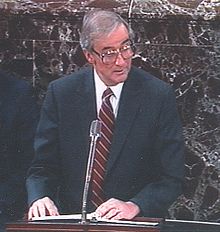Walter Nixon
This article includes a list of general references, but it lacks sufficient corresponding inline citations. (April 2009) |

Walter Nixon | |
|---|---|
| Judge of the U.S. District Court for the Southern District of Mississippi | |
| In office June 7th, 1968 – November 3rd, 1989 | |
| Nominated by | Lyndon B. Johnson |
| Preceded by | seat authorized by 80 Stat. 75 |
| Chief Judge of the U.S. District Court for the Southern District of Mississippi | |
| In office 1982 – November 3rd, 1989 | |
| Succeeded by | William Henry Barbour Jr. |
Walter Louis Nixon Jr. (born 1928) is a former United States federal judge who was impeached by the House of Representatives and removed from office by the Senate.[1] Because Nixon's impeachment was for perjury, the case was cited as a precedent in the impeachment trial of President Bill Clinton.[2][failed verification][3] Despite his surname Walter Nixon has no relation to the 37th U.S. President Richard Nixon.
Biography
Early life
Nixon was born in Biloxi, Mississippi.[1] He attended Tulane University Law School, graduating in 1951 and went into private practice in his hometown of Biloxi. He also served in the United States Air Force from 1953 to 1955.[1]
On May 29, 1968, Nixon was nominated by President Lyndon B. Johnson to a new seat on the United States District Court for the Southern District of Mississippi, created by 80 Stat. 75.[1] He was confirmed by the United States Senate on June 6, 1968, and received his commission on June 7, 1968.[1] In 1982, due to his length of tenure, he became Chief Judge of the same District Court.[1]
Impeachment
Nixon was convicted in 1986 on perjury charges and sentenced to 5 years in prison. The offense stemmed from his grand jury testimony and statements to federal officers concerning his intervention in the state drug prosecution of Drew Fairchild, the son of Wiley Fairchild, a business partner of Nixon. Although the case was assigned to a state court, Wiley Fairchild had asked Nixon to help out by speaking to the prosecutor. Nixon did so, and the prosecutor, a long-time friend, dropped the case. When Nixon was interviewed by the Federal Bureau of Investigation (FBI) and the Department of Justice, he denied any involvement whatsoever. Subsequently, a federal grand jury was empaneled and he again denied his involvement. He was convicted of making false statements to a grand jury.
Nixon refused to resign and continued to both hold the title of Federal Judge and collect his judicial salary in prison. In 1989, he was impeached by the House of Representatives and convicted by the Senate, for committing perjury before a grand jury. Upon his conviction by the Senate, he was officially removed from office and permanently banned from the federal judiciary.[4]
Nixon appealed his impeachment and removal to the United States Supreme Court. In Nixon v. United States, handed down in 1993, the Court rejected his appeal as a nonjusticiable political question.[5]
Life after prison
He was disbarred in 1990. The State Supreme Court ruled in May 1993 that he could be readmitted to the state bar after passing the exam. As of September 2007[update] he lives and practices law in Biloxi and[vague] in Lake Charles, Louisiana.
See also
Sources
- ^ a b c d e f Walter Louis Nixon Jr. at the Biographical Directory of Federal Judges, a publication of the Federal Judicial Center.
- ^ Impeachment of President William Jefferson Clinton, evidentiary record.
- ^ Jeffrey, Terence P. (1998-10-09). "Nixon's the one--That's Walter not Dick". Human Events. Retrieved 2009-06-15.
{{cite web}}: Italic or bold markup not allowed in:|publisher=(help) - ^ https://www.nytimes.com/1989/11/04/us/senate-convicts-us-judge-removing-him-from-bench.html
- ^ Nixon v. United States, 506 U.S. 224 (1993).
- 1928 births
- Living people
- Judges of the United States District Court for the Southern District of Mississippi
- United States district court judges appointed by Lyndon B. Johnson
- 20th-century American judges
- Disbarred American lawyers
- Impeached United States federal judges
- Impeached United States officials removed from office
- Tulane University alumni
- Tulane University Law School alumni
- People from Biloxi, Mississippi
- People convicted of making false statements
